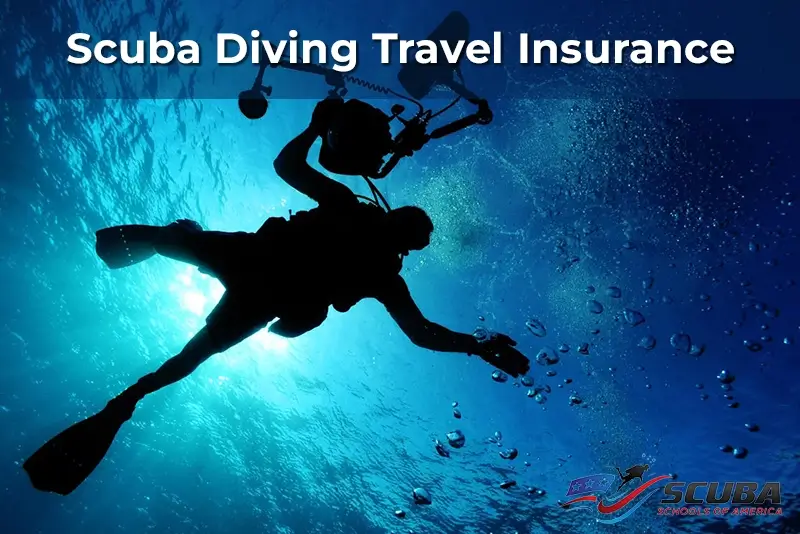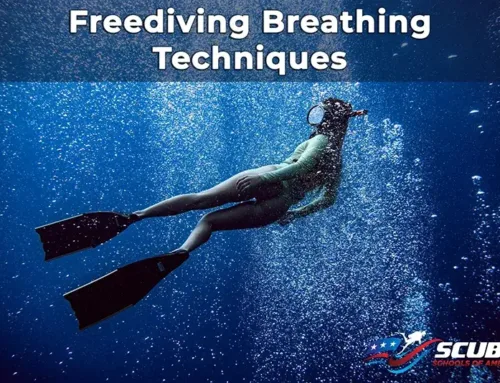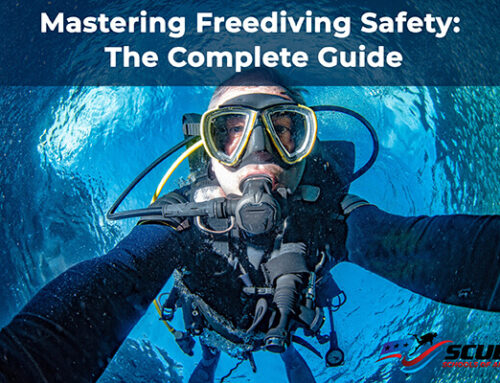Scuba diving insurance can often be a confusing topic for many divers. Questions like, “Is it covered by my travel insurance?” or “Do I even need scuba diving insurance?” frequently arise. Some might assume that the dive center is responsible for any issues that come up during a dive, but the reality is more nuanced. If you’ve found yourself wondering about these details, you’re not alone.
In this guide, I’ll help clarify the key points of scuba diving insurance and recommend a few reliable insurance providers, including those tailored to the needs of divers through organizations like Scuba Schools of America.
Do You Really Need Scuba Diving Insurance?
The decision to purchase scuba diving insurance is a personal one, but it largely depends on the type of diving you’ll be doing, how much coverage you desire for your health and equipment, and the level of risk you’re willing to take. Many divers skip insurance altogether, particularly if they assume their travel insurance will cover any potential issues (more on that shortly).
While it’s true that most divers go on their trips without ever needing to file a claim, scuba diving involves inherent risks. Even something as seemingly minor as a day of diving being canceled due to weather conditions can cause disruptions, while more serious events such as equipment failure or medical emergencies may occur.
Without the proper coverage, you could be left in a difficult position, unable to recover losses or access necessary medical care.
If you’re carrying expensive gear, such as high-end cameras or technical diving equipment, having scuba diving insurance becomes even more critical. A single mishap could result in significant financial loss, and having insurance could help safeguard your investments while providing you with peace of mind.
Recompression Chamber (Hyperbaric Chamber Treatment)
One of the biggest risks divers face is decompression sickness (DCS), also known as “the bends.” This occurs when nitrogen bubbles form in the bloodstream due to rapid changes in pressure.
Divers who ascend too quickly or have an improperly balanced dive profile are most at risk. The symptoms range from joint pain to severe neurological complications, and treatment often requires a recompression chamber, also called a hyperbaric oxygen chamber.
These chambers are specifically designed to reverse the effects of DCS by slowly reintroducing pressure to the body, turning nitrogen back into a liquid and alleviating the symptoms. However, the treatment can be extremely costly. Depending on your location, the cost for hyperbaric treatment can exceed $1,000 per hour.
While DCS is rare, it remains a possibility for divers, even when safety protocols are followed. Moreover, finding a recompression chamber in remote areas can be a challenge, so having insurance that covers this type of emergency is a wise choice for serious divers.
Travel Insurance With Scuba Diving Cover
Many people assume their travel insurance will cover scuba diving accidents or mishaps, but the reality is more complicated. While some travel insurance policies do offer limited coverage for scuba diving, the level of protection is often insufficient, especially for more advanced or deep dives.
The vast majority of travel insurance policies will only cover recreational diving up to a depth of around 30 meters. If you’re planning on doing specialized dives, such as wreck diving or cave diving, you may find that these activities are not covered.
Furthermore, most travel insurance plans will not cover damage to your personal diving equipment or medical emergencies related to diving.
For those looking for comprehensive coverage, specialized scuba diving insurance is the best route to go. Companies that specialize in scuba diving insurance offer far more robust policies that can include things like lost or damaged equipment, missed days of diving due to illness, emergency medical evacuation, and, importantly, treatment for decompression sickness.
Some providers will even cover the costs of hyperbaric chamber treatment should you need it, with coverage limits far higher than what standard travel insurance offers.
Does Annual Travel Insurance Cover Scuba Diving?
Yes, some annual travel insurance policies, also known as multi-trip plans, offer coverage for scuba diving. This can be an affordable option for travelers planning multiple trips within a 12-month period. However, like single-trip insurance, these policies must include specific language in their terms to cover adventure sports like scuba diving. Always review the fine print to ensure that your travel plans and activities are covered.
Best Dive Insurance: A Guide by Scuba Schools of America

As we explore the top three scuba diving insurance companies, you’ll gain insights into why having specialized dive insurance is crucial for serious divers. Here are our top picks at Scuba Schools of America:
1. DiveAssure
With over 235,000 members worldwide, DiveAssure offers a range of insurance options, including single-trip, multi-trip, and even liveaboard plans. Here’s why DiveAssure ranks among the top choices for serious divers:
- Primary Insurance: DiveAssure’s primary coverage allows real-time payouts directly to service providers, so you don’t have to wait on other insurers before receiving the support you need.
- Medical Expenses: Coverage of up to $750,000 per occurrence.
- Emergency Medical Evacuations: Up to $250,000 covered, with an additional $500,000 for extra costs.
- Hyperbaric Treatment: Quick access to hyperbaric facilities worldwide.
- Liveaboard Coverage: Additional liveaboard trip protection is available for deluxe or elite plans.
- Medical Hotline: DiveAssure membership includes 24/7 access to a medical hotline for both emergency and non-emergency advice.
DiveAssure is a highly recommended provider here at Scuba Schools of America, giving divers peace of mind and reliable assistance when needed.
2. Divers Alert Network (DAN) US
DAN offers a membership-based insurance scheme with options for dive accident, travel, and liability insurance.
- Accident Coverage: Pays 100% of eligible accident medical expenses, up to $500,000.
- Diver Eligibility: Covers U.S. and Canadian divers aged 70 and older.
- Global Recognition: DAN’s membership and insurance schemes are recognized worldwide.
DAN stands out as one of the most trusted options for dive insurance, offering a solid range of coverage and support options.
3. World Nomads
World Nomads provides travel insurance with special options for divers, offering broader coverage than typical travel insurance providers. Their standard and explorer plans cater to diving activities with specific coverage for:
- Depths up to 50m: Suitable for qualified divers.
- Adventure Activities: Shark cage diving, snorkeling, liveaboard trips, and island excursions.
Be sure to check terms and conditions with World Nomads, especially if planning high-risk activities such as shark diving in South Africa, as additional premiums may apply.
Scuba Schools of America highly recommends choosing dive insurance from reputable providers like these to ensure you have comprehensive coverage and peace of mind on your diving adventures.
What’s Covered with Scuba Diving Insurance
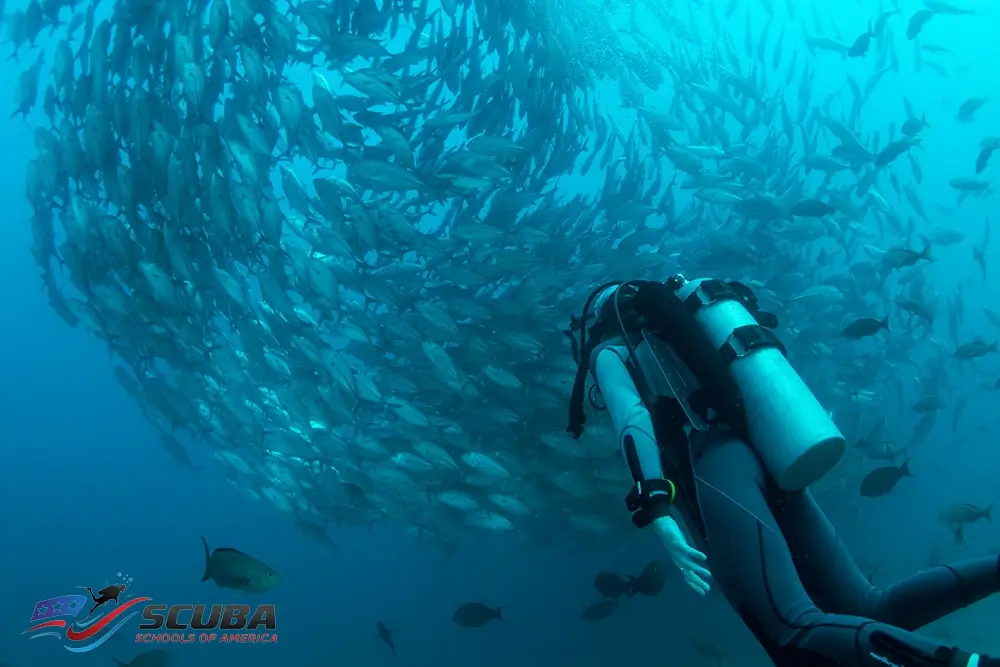
Whether you’re diving locally in California or exploring international waters, scuba diving involves certain risks. At Scuba Schools of America, we recommend having comprehensive scuba diving insurance to ensure you’re protected from unforeseen events. Here’s what a typical scuba diving insurance policy covers:
- Emergency Medical Expenses & Repatriation: Covers costs of emergency medical treatment and transportation if needed.
- Search and Rescue: Assistance with search and rescue efforts in the event of an emergency.
- Trip Cancellation & Curtailment: Protects against financial losses if your dive trip is unexpectedly canceled or cut short.
- Personal Accident: Coverage for injuries that result in disability or death.
- Personal Liability: Protection from legal liability for accidents involving other people or their property.
- Baggage Coverage: Reimbursement for delayed, lost, or stolen baggage.
- Sports Equipment: Coverage for damage or loss of sports equipment, including scuba gear.
Scuba Diving Insurance: What is Not Covered
While scuba diving insurance is comprehensive, there are specific exclusions you should be aware of:
- Unaccompanied Dives: Any dive without a buddy or instructor.
- Professional Dives: Dives for profit or reward are typically excluded.
- Depth Restrictions: Any dive beyond your certification limits or deeper than 50m, regardless of qualifications.
- Medical and Travel Warnings: Coverage is void if you travel against medical advice or ignore government “do not travel” warnings.
- Pre-existing Medical Conditions: Unless specified in the policy, pre-existing conditions may not be covered.
- Non-covered Sports/Activities: Engaging in sports or activities not listed in the policy or without paying the additional premium.
- Post-trip Expenses: Any expenses incurred after returning to your home country.
- Professional Participation: Any work-related diving or participation in sports not covered under the policy.
Handy Tips for Safe Scuba Diving
At Scuba Schools of America, we believe in safe diving practices. Here are some tips to help you stay safe:
- Medical Clearance: Only dive if you are medically fit. It may be necessary to get clearance from a healthcare provider before diving.
- Gear Check: Regularly check all equipment to ensure it’s functioning properly, and always perform a buddy check before dives.
- Follow Dive Protocols: Listen carefully to your instructor or dive guide about the dive route, safety procedures, and important sights.
- Dive with Reputable Providers: Choose companies like Scuba Schools of America, known for certified, seaworthy boats and well-maintained gear. Verify your instructor’s credentials and, when possible, dive with the top divers of Scuba Schools of America for an optimal and safe diving experience.
Scuba Schools of America encourages all divers to ensure they have the right insurance and follow these safety tips for an enjoyable and protected diving experience.
Why Might You Need Specific Travel Insurance as a Scuba Diver?
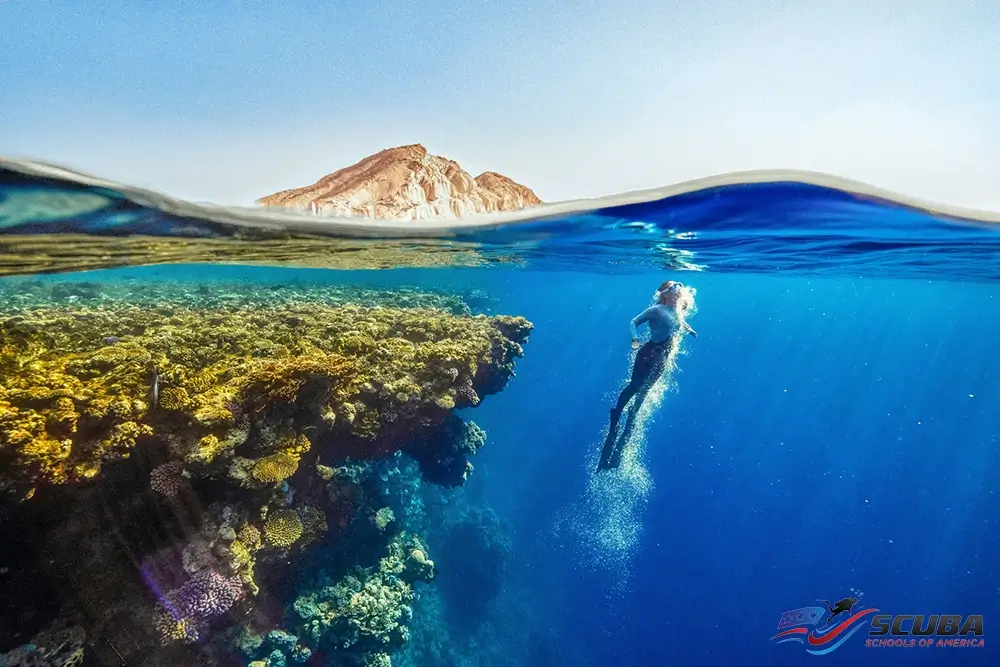
Specific travel insurance tailored for scuba divers offers additional flexibility, such as coverage for personal possessions and scuba equipment in case of loss. Depending on the nature of your trip, you may also need higher coverage limits for cancellation costs or prefer covering your entire family under one policy. Scuba diving insurance can help protect you from paying out-of-pocket for medical bills related to life-threatening injuries that may not be covered by standard health or travel insurance.
As a general rule, the deeper you dive, the higher the risks, and insurance may not cover those deeper dives. Given these risks, it’s worth investing the extra time, research, and money into specialized insurance providers to ensure you’re fully protected.
Does Health Insurance Cover Scuba Diving?
No, most primary health insurance plans, such as Medicare or employer-sponsored policies, do not provide coverage for dive accidents, especially when traveling abroad. If you’re planning a trip outside the USA and intend to go scuba diving, snorkeling, or participate in other activities that are commonly excluded, we recommend looking into third-party trip insurance from a reputable provider for overseas medical coverage.
Comprehensive Scuba Diving Travel Insurance Guide with Scuba Schools of America
While some may rely solely on standard travel insurance, specialized dive insurance often offers much more comprehensive protection, especially for those venturing into deeper or more challenging dives.
Before your next dive trip, consider the advantages of dedicated scuba insurance to safeguard your health, equipment, and overall experience, allowing you to focus on the wonders beneath the waves.
Have questions about scuba diving insurance or need guidance on choosing the right coverage for your dive adventures? At Scuba Schools of America, we’re here to help you make informed decisions for a safe and enjoyable diving experience.
Reach out to our team for personalized assistance or to learn more about our recommendations for reputable insurance providers that cater specifically to divers. Whether you’re a beginner or an experienced diver, we’re ready to provide expert advice and support.
Get in touch with Scuba Schools of America today to ensure you’re fully prepared and protected on your next dive. We look forward to assisting you!

